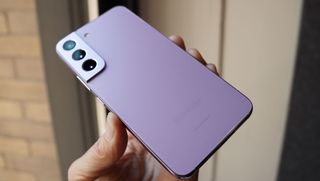The Samsung Galaxy S23 could have the best chipset of any 2023 Android phone
The best version of the best chipset

We’ve been hearing for a while that Samsung will reportedly use the Snapdragon 8 Gen 2 chipset globally in the Galaxy S23 line, which was already good news for reasons we’ll get into below. But now it looks like the company might go one better, and equip these phones with an exclusive, even more powerful variant of the chipset.
That’s according to @UniverseIce – a leaker with a solid track record – who’s done some digging and found various pieces of evidence to support this claim.
First, they posted a screenshot from a benchmark for the Samsung Galaxy S23, showing a clock speed of up to 3.36GHz – which is higher than the 3.2GHz speeds the Snapdragon 8 Gen 2 typically offers. Next, they claimed that multiple different model numbers exist for the Snapdragon 8 Gen 2.
Finally they claimed to have “confirmed” that the Samsung Galaxy S23 will use a high-frequency version of the Snapdragon 8 Gen 2 that’s exclusive to Samsung.
Breaking!The best moment for European users has arrived.The European version of the Samsung Galaxy S23 series is confirmed to use the Snapdragon 8 Gen2, and it is a high-frequency version exclusive to Samsung. Please enjoy it. pic.twitter.com/w6DqCdH30bNovember 16, 2022
Interestingly, they say this chip will be used in the European version of the Samsung Galaxy S23 line, so it’s not clear whether the same supercharged chipset will be used in the rest of the world or not.
But in Europe at least, the Galaxy S23 and its siblings could be the most powerful Android phones on the planet – though as ever we’d take this claim with a pinch of salt for now.
Analysis: making the best chipset better
If the Samsung Galaxy S23 line really does have exclusive access to a better version of the Snapdragon 8 Gen 2, then it’s unlikely that any other 2023 Android phone will be able to match these handsets. Typically the top Snapdragon chipset of a given year is the best chipset available to Android phones, and there’s no sign that 2023 will be any different.
Get daily insight, inspiration and deals in your inbox
Get the hottest deals available in your inbox plus news, reviews, opinion, analysis and more from the TechRadar team.
That’s why it’s good news that Samsung will reportedly be offering Snapdragon chipsets globally, rather than shipping the phones with its own Exynos chipsets in some regions as it's done in the past – and if it’s using an even better version of that chipset, then that’s even better news.
Hopefully, that better version will be offered globally, but if it is limited to Europe then that would perhaps be fitting, as historically Europe has been among the regions that were lumbered with inferior Exynos chipsets.
Of course, this will all be bad news for the other manufactures launching new phones in 2023, as Samsung already outsells other Android handset makers, and its devices are permanent fixtures in our best phones rankings – and having a superior chipset could just extend the company’s lead.
James is a freelance phones, tablets and wearables writer and sub-editor at TechRadar. He has a love for everything ‘smart’, from watches to lights, and can often be found arguing with AI assistants or drowning in the latest apps. James also contributes to 3G.co.uk, 4G.co.uk and 5G.co.uk and has written for T3, Digital Camera World, Clarity Media and others, with work on the web, in print and on TV.
Most Popular


